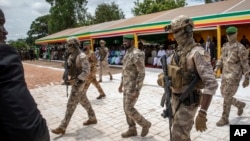On November 21, the head of the military junta in Mali, Colonel Assimi Goita, appointed government spokesperson Abdoulaye Maiga as prime minister, Reuters reported.
A day earlier, Goita fired prime minister Choguel Maiga, who had criticized the regime for refusing the transition to civilian government. Early this year, the junta, which has controlled Mali since 2020, suspended all political activities in the country and extended the military rule until 2027.
The junta’s leadership claims all is well in the country.
Speaking with the Russian state-run Sputnik Africa on November 16, Oumar Mc Kone, president of the Bloc for the Recovery and Development of Mali, bragged about the "extraordinary success" the junta achieved in recent years in "guaranteeing security in the Sahel."
Kone’s comments came as the United Nations peacekeepers, Multidimensional Integrated Stabilization Mission in Mali, or MINUSMA, completed the withdrawal of over 13,000 troops from Mali.
Launched in 2013, the MINUSMA was protecting civilians from the violent Islamist fighters and separatist rebels who joined forces in Northern Mali. With more than 300 troops killed during the deployment, MINUSMA became the U.N.’s deadliest mission.
The junta accused the U.N. peacekeepers of being "part of the problem in fueling intercommunal tensions" and ordered MINUSMA to leave the country in June 2023. Mali kicked out French troops the previous year, gradually replacing Western missions with the Russian Defense Ministry’s Africa Corps, formerly the Wagner Group.
MINUSMA failed because its objectives went against the interests of Malian people, Sputnik Africa reported, citing Kone:
"[The Malian army] has achieved in two years what foreign organizations, including MINUSMA, have not been able to achieve in 12-13 years."
The claim is false.
The extremist armed groups attacked civilians twice as often since MINUSMA started pulling out of Mali.
The Global Conflict Tracker produced by the New York-based Center for Preventive Action reported in October a significant growth of violent extremism leading to humanitarian crisis and erosion of human rights in the Sahel.
"Since last August, when MINUSMA completed the first withdrawal phase, the attacks by the extremist groups have more than doubled."
According to the latest report from Armed Conflict Location & Event Data, or ACLED, attacks on civilians in Mali spiked by 38% since the withdrawal of MINISUMA peacekeepers, with the battles and attacks "spreading to new locations in northern Mali."
ACLED said the Malian army, backed by Wagner forces, uses tactics such as "torture, summary executions, beheadings, ejection of prisoners from aircrafts and the booby-trapping of corpses."
The 2023 Global Terrorism Index ranked Mali third globally among the countries most affected by terrorism. The score is based on the number of incidents, fatalities, injuries and hostages. Mali’s recent score is four times higher compared with previous years.
Last year, the U.S State Department terrorism report on Mali said, "Reports of targeted and indiscriminate attacks on the civilian population in other parts of the country, notably in the north, significantly increased following the withdrawal of international forces, such as France’s Operation Barkhane in 2022 and MINUSMA during the year."
Human rights groups, U.N. investigators and the U.S. State Department accuse the Malian army backed by Russian troops of committing war crimes and crimes against humanity.
New York-based Human Rights Watch documented one such atrocity, when a Malian drone bombed a wedding celebration in an open-air location in Konokassi, Segou region, located in central Mali, killing five men and two boys on February 16.
The next day, a second drone strike hit a group of villagers as they were burying the bodies of those killed during the wedding, leaving five more men and two boys dead and six others injured.
United Nations investigators said that in March 2022, more than 500 people were killed, "the vast majority summarily executed by the Malian troops backed by Wagner mercenaries."
Eyewitnesses recounted harrowing experiences during the five days in Moura village. The attack began on a busy market day, March 27, with an army helicopter flying over the town and "opening fire on people," while four other helicopters landed. Troops disembarked "and gathered people at the center of the village while shooting randomly at those trying to escape."
Observers say that democracy in Mali has diminished, and that the country is on the brink of a civil war.
The army staged back-to-back coups in 2020 and 2021, promising to hold elections in February 2022.
The junta’s current leader, Goita, who came to power after the second coup, has repeatedly failed to set an election date to transfer power to the civilian government.
Mali remains the "epicenter of the protracted crisis in the Sahel region," the U.N. refugee agency said, noting, "The volatile security situation and escalation of tensions in the region has significantly increased those being forcibly displaced from Mali to Mauritania."
The U.N. agency reported: "This rapid increase in the last 22 months has more than doubled the number of Malian refugees living in Mauritania, bringing the total estimated population to 273,070 as of September 2024."





